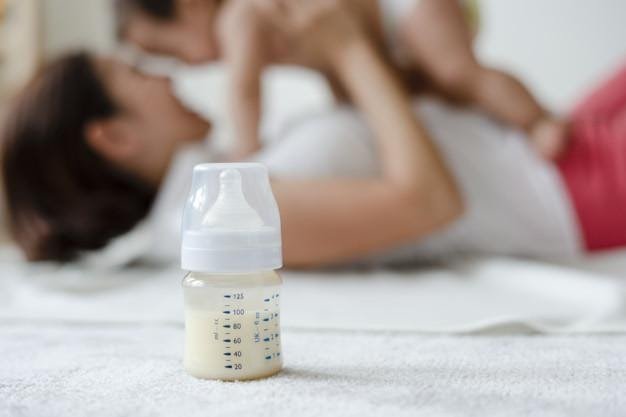
Switch to the Best Baby Formula
It is vital to have an idea of what you’re feeding your baby. Especially the nutrients their food contains.
Just like adults, babies also require food intake that suits their taste and stomach. If it doesn’t suit them, it can result in sickness and indigestion. For a baby, indigestion can take quite a toll on them as babies are fragile and need to be cared for in the best way.
Baby formula is an entirely manufactured food that is marketed and distributed for the purpose of feeding newborns and infants under the age of 12 months. It is typically produced in powder or liquid form for bottle-feeding or cup-feeding.
There are many advantages to feeding your baby formula. For instance, some mothers are unable to breastfeed their babies or need to be at work. In cases like these, the baby formula comes in handy.
In other words, it’s convenient and flexible. When you are busy with work or tired after a long day, your partner can step in and be in charge of feeding the baby. Mothers feeding baby formula don’t have to worry about their food intake while moms who breastfeed may have to avoid certain foods that their baby can’t tolerate.
Other than that, it also contains several health benefits. It helps your baby against ear infections, diarrhea, respiratory infections, and meningitis.
However, you can see some side effects and your baby rejecting to intake the baby formula at a certain point. That’s when you need to be sure about switching their baby formula. If you noticed some changes in their behavior, that might also be a sign it’s time to change their formula.
As a parent, the first thing you need to keep an eye on is what your baby likes and accepts the formula. If it’s a food they’re declining, it’s most likely they aren’t enjoying. And force-feeding is never good for your child.
You have to understand not every formula out there will work with every baby, and you might have to get out there and get the perfect formula for your baby.
Reasons Why You Need to Switch Your Baby’s Formula
You might still be in the dark about your baby’s preferences and knowledge of their formula and the necessary nutrients they need. Besides baby formula reviews, here are some reasons to help you with why it’s high time for you to change your baby’s formula.
1. Nutrients Require More Iron
One of the most essential nutrients your baby requires for growing up is iron. Iron deficiency can make your baby weak. They will also develop a weak immune system. There are many minerals and nutrients that our bodies need to be able to perform at their best.
Babies and children need iron for their brains to develop normally. A baby with a healthy amount of iron in their system will help them grow faster and have more brain function and reflexes.
Iron also helps move oxygen from the lungs to the rest of the body and allows muscles to store and use oxygen. So for better respiration and nervous system, your baby requires iron.
Signs that indicate your baby isn’t getting enough iron are if they have pale skin and no appetite.

2. Your Baby is Having a Hard Time Sleeping
Typically babies are supposed to sleep for long hours. If your baby is having trouble sleeping, it can be a sign that you need to change the baby formula. Sleep is one of the most important things for babies as they’re growing a lot, which takes a lot out of them.
Adequate sleep improves attention, behavior, learning, memory, and overall mental and physical health.
A well-rested baby is always a happy and healthy baby. A baby requires to sleep eight to nine hours in the daytime and at least eight more hours at night. If your baby isn’t sleeping and being fussy, it could be a sign they’re having trouble digesting the baby formula.
3. They’re Probably Feeling Weak
Baby formula is supposed to make your baby strong and active. However, if you see your baby experiencing fatigue and overall being inactive, you should consider changing the baby’s formula.
A baby experiencing fatigue or weakness will not have any energy when they’re up and will sleep longer than they usually do. Babies can even be hard to wake up for a feeding. They are caused by a lack of proper nutrients in the formula, which makes the babies weak and experience fatigue.
The babies need a formula that will keep them alert and active when they’re not sleeping. That is a vital sign of a healthy baby. If you see that the formula you’re giving your baby is not keeping them up or alert at times, then you need to switch it.
4. Check If Your Baby is Experiencing Extra Gas
Having gas and burping is very normal for a baby. Letting out a burp means they’re having healthy and proper digestion. However, having more gas than usual can be a matter of concern.
It’s usually the formula and its ingredients that can get your baby extra gassy. It should be about time you should change the baby’s formula. Extra gas may make the baby’s stomach look bloated or feel stiff when you touch it.
However, to be 100 percent sure about what’s making your baby gassy, you should consult a pediatrician. There might be other reasons why your baby is feeling stuffy and gassy. Don’t delay seeing a pediatrician because it can be very uncomfortable for your baby.
5. Signs of Allergies
There are certain ingredients in the formula that can make your baby have an allergic reaction. Make sure you see signs of certain allergies. To figure out your baby’s allergies consult a pediatrician. You may be surprised to learn that one of the biggest allergies for babies is being allergic to milk.
Most formulas out there are milk-based formulas. Luckily, there are other types of formulas available as well, like soy-based or other plant-milk-based formulas. Take an allergy test for your baby at your pediatrician’s to avoid any kind of mishaps.
6. Wheezing After Drinking Can Be a Sign
If your baby wheezes right after you feed them, it’s a sign there is something wrong with the formula you are feeding them. If your baby wheezes after consuming the formula, then it is because their chest is congested with mucus. It is not normal after a feeding.
This is a sign your baby is taking in something that is building up the mucus in them. You need to take out this mucus as soon as possible from their system. A clogged system can lead to other health-related complications.
Consult with your family doctor to see what steps you should be taking next for a speedy recovery of your baby.
7. Acting Fussy After Feeding Them
If your baby acts all fussy even after you’ve fed them, it is a major sign they are feeling uncomfortable about something. Normally a baby is in a good mood after they have their stomach full.
Babies are usually fussy when they are hungry, needing a diaper change, or needing to sleep. If they fuss even after having the formula, that could be because something isn’t suiting them. Something that does not agree with their body, and they’re in pain. As the babies can’t talk, they’ll express it by being fussy. You should look into changing formulas if this becomes a trend.

8. When Your Baby Has Diarrhea
Diarrhea is mainly caused due to contaminated food intake. If your baby is always experiencing diarrhea after feeding, then this is a sign you need to switch their formula. Something might be wrong with the formula to give them an upset stomach.
This usually happens when the formula isn’t being accepted by the body’s system. As an alternative, try out other brands in the market. Ask your baby’s doctor before you switch formulas. You should definitely consult your doctor if your baby has frequent diarrhea.
Too much of it can also indicate other weaknesses other than unsuitable baby formula.
9. Signs of Vomiting and Rashes
When the formula doesn’t suit your baby, it’s quite normal your baby might vomit. If it’s forceful projectile vomiting that you can tell is hurting them since they’re trying to get something out of their system.
If they’re vomiting, make sure you switch the formula as soon as possible because each time they vomit, they are rejecting vital nutrients they need for their development. So it is important for you to arrange ways for your baby to retain the carefully formulated nutrients.
Along with a lot of other reasons, if your baby develops a rash, then it could be due to their formula. Do not ignore a rash that your baby has since it can be related to the type of formula she’s having.
Choose the Best for Your Baby
The best option can usually be the more expensive option out there, but whatever is good for your baby should be prioritized. Your baby’s health comes before anything. For your baby’s proper growth and bright future, you need to consider switching to better baby formula.




